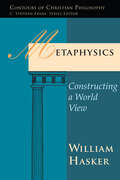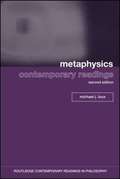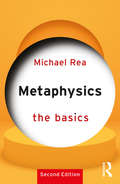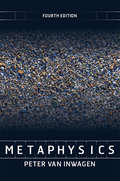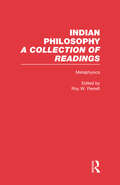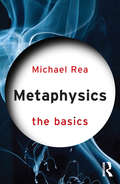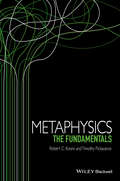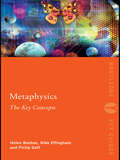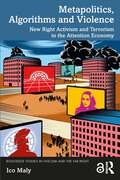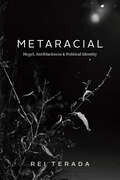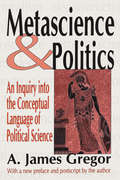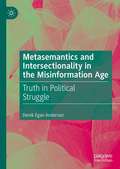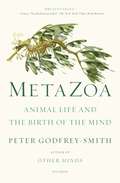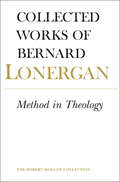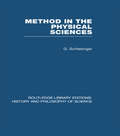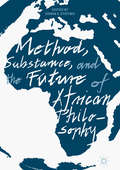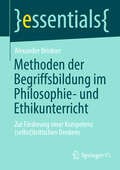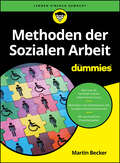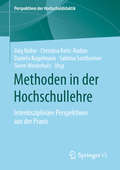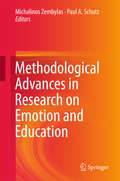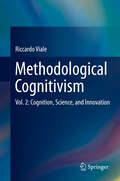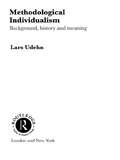- Table View
- List View
Metaphysics: Constructing A World View (Contours of Christian Philosophy)
by William HaskerWhat is ultimately real? What is God like? Do human beings have minds and souls or only brains in bodies? Are humans free agents or are all human acts determined by prior circumstances? Through insightful analysis and careful evaluation, William Hasker helps readers answer these questions and thereby construct a world view to make sense of the universe and the people in it.
Metaphysics: Contemporary Readings (2nd Edition)
by Michael J. LouxMetaphysics: Contemporary Readings is a comprehensive anthology that draws together leading philosophers writing on the major themes in Metaphysics. Chapters appear under the headings: Universals Particulars Modality and Possible Worlds Causation Time Persistence Realism and Anti-Realism. Each section is prefaced by an introductory essay by the editor which guides students gently into each topic. Articles by the following leading philosophers are included: Allaire, Anscombe, Armstrong, Black, Broad, Casullo, Dummett, Ewing, Heller, Hume, Kripke, Lewis, Mackie, McTaggart, Mellor, Merricks , Parfit, Plantinga, Price, Prior, Putnam, Quine, Russell, Smart, Swinburne, Taylor , Van Cleve, van Inwagen, Williams. Featuring a new section on causation, this new edition is highly accessible and provides a broad-ranging exploration of the subject. Ideal for any philosophy student, this reader will prove essential reading for any metaphysics course. The sections and selections of readings have been updated to complement Michael Loux's textbook Metaphysics: A Contemporary Introduction, third edition.
Metaphysics: Critical Concepts In Philosophy (The Basics)
by Michael ReaMetaphysics: The Basics is a concise and engaging introduction to the philosophical study of some of the most important and foundational aspects of the world in which we live. Concerned with questions about existence, time, identity, change, and other basic elements of our common-sense and scientific ways of thinking about the world, metaphysics has long fascinated people. But to the uninitiated, many of the issues and problems can appear bewilderingly complex and intractable. In this lively and lucid book, Michael Rea examines and explains the core questions in the study of metaphysics—questions such as: What is the relationship between an object and its properties, or between an object and its parts? What is time, and is time travel possible? Are human beings free? What is it for an object or person to persist over time? This second edition has been thoroughly revised and includes a new chapter on the metaphysics of gender. With suggestions for further reading and a glossary of key terms, Metaphysics: The Basics is an ideal introduction for those coming to the subject for the first time.
Metaphysics: Essays In Metaphysics (Dimensions Of Philosophy Ser.)
by Peter Van InwagenWith thoughtful and engaging prose, noted scholar Peter van Inwagen provides a comprehensive introduction to metaphysics in this essential text. Metaphysics covers the gamut of historical and contemporary arguments of metaphysics, engaging readers through three profound questions: What are the most general features of the world? Why is there a world? And, what is the place of human beings in the world?The thoroughly revised fourth edition includes an updated and rewritten chapter on temporality and significant improvements to the clarity and accessibility of the language, making it an even more valuable text for undergraduate students. Metaphysics remains the quintessential book in this field of study, and a fascinating book for a wide range of readers, from those new to the subject to the most sophisticated philosophers.
Metaphysics: Indian Philosophy
by Roy W. PerrettFirst Published in 2001. Routledge is an imprint of Taylor & Francis, an informa company.
Metaphysics: The Basics (The Basics)
by Michael ReaMetaphysics: The Basics is a concise and engaging introduction to the philosophical study of the world and universe in which we live. Concerned with questions about reality, existence, time, identity and change, metaphysics has long fascinated people but to the uninitiated some of the issues and problems can appear very complex. In this lively and lucid book, Michael Rea examines and explains key questions in the study of metaphysics such as: • Can two things be in the same place at the same time? • Do creatures of fiction exist? • Are human beings free? • Is time travel possible? • Is there just one world or many worlds? With a glossary of key terms and suggestions for further reading, the book considers key philosophical arguments around Metaphysics, making this an ideal starting point for anyone seeking a full introduction to the debates both within and about metaphysics.
Metaphysics: The Fundamentals (Fundamentals of Philosophy)
by Robert C. Koons Timothy PickavanceMetaphysics: The Fundamentals presents readers with a systematic, comprehensive introductory overview of modern analytic metaphysics. Presents an accessible, up-to-date and broad-ranging survey of one of the most dynamic and often daunting sub-fields in contemporary philosophy Introduces readers to the seminal works of contemporary and historic philosophers, including Descartes, Leibniz, Russell, David Lewis, Alvin Plantinga, Kit Fine, Peter van Inwagen, John Hawthorne and many others Explores key questions while identifying important assumptions, axioms, and methodological principles Addresses topics in ontology, modality, causality, and universals; as well as issues surrounding material composition, persistence, space, and time
Metaphysics: The Key Concepts (Routledge Key Guides)
by Philip Goff Nikk Effingham Helen Beebee‘Informative, accessible, and fun to read— this is an excellent reference guide for undergraduates and anyone wanting an introduction to the fundamental issues of metaphysics. I know of no other resource like it.’– Meghan Griffith, Davidson College, USA 'Marvellous! This book provides the very best place to start for students wanting to take the first step into understanding metaphysics.Undergraduates would do well to buy it and consult it regularly. The quality and clarity of the material are consistently high.' – Chris Daly, University of Manchester, UK Ever wondered about Gunk, Brains in a Vat or Frankfurt’s Nefarious Neurosurgeon? With complete explanations of these terms and more, Metaphysics: The Key Concepts is an accessible and engaging introduction to the most widely studied and challenging concepts in metaphysics. The authors clearly and lucidly define and discuss key terms and concepts, under the themes of: time particulars & universals realism & antirealism free will personal identity causation and laws. Arranged in an easy to use A-Z format, each concept is explored and illustrated with engaging and memorable examples, and accompanied by an up-to-date guide to further reading. Fully cross-referenced throughout, this remarkable reference guide is essential reading for students of philosophy and all those interested in the nature of reality.
Metapolitics, Algorithms and Violence: New Right Activism and Terrorism in the Attention Economy (Routledge Studies in Fascism and the Far Right)
by Ico MalyMetapolitics, Algorithms and Violence argues that we need a more finegrained approach to understand contemporary far-right violence – an approach that takes language and cultural production in a digital economy seriously. This book underlines the importance of socio-political, economic, historical and technological context in understanding the rise of the new right. More concretely, based on a digital ethnographic approach, it argues that we should understand this violence and the contemporary rise of new far-right practices and actors in relation to the theoretical renewal of ‘La Nouvelle Droite’ in the 20th century; the ‘democratization’ of new right metapolitics in the 21st century as a result of the rise of digital media; and the development of a layered, transnational and polycentric new right cultural niche in which far-right activists and terrorists produce identity, discourse, digital cultures and practices. This work will be an engaging and necessary read for researchers interested in social media, digital culture, far-right politics, extremism and terrorism.
Metapolitics, Algorithms and Violence: New Right Activism and Terrorism in the Attention Economy (Routledge Studies in Fascism and the Far Right)
by Ico MalyMetapolitics, Algorithms and Violence argues that we need a more finegrained approach to understand contemporary far-right violence – an approach that takes language and cultural production in a digital economy seriously. This book underlines the importance of socio-political, economic, historical and technological context in understanding the rise of the new right. More concretely, based on a digital ethnographic approach, it argues that we should understand this violence and the contemporary rise of new far-right practices and actors in relation to the theoretical renewal of ‘La Nouvelle Droite’ in the 20th century; the ‘democratization’ of new right metapolitics in the 21st century as a result of the rise of digital media; and the development of a layered, transnational and polycentric new right cultural niche in which far-right activists and terrorists produce identity, discourse, digital cultures and practices. This work will be an engaging and necessary read for researchers interested in social media, digital culture, far-right politics, extremism and terrorism.
Metaracial: Hegel, Antiblackness, & Political Identity
by Rei TeradaA formidable critical project on the limits of antiracist philosophy. Exploring anxieties raised by Atlantic slavery in radical enlightenment literature concerned about political unfreedom in Europe, Metaracial argues that Hegel's philosophy assuages these anxieties for the left. Interpreting Hegel beside Rousseau, Kant, Mary Shelley, and Marx, Terada traces Hegel's transposition of racial hierarchy into a hierarchy of stances toward reality. By doing so, she argues, Hegel is simultaneously antiracist and antiblack. In dialogue with Black Studies, psychoanalysis, and critical theory, Metaracial offers a genealogy of the limits of antiracism.
Metascience and Politics: An Inquiry into the Conceptual Language of Political Science
by A. James GregorA central problem in political inquiry is the conceptual and linguistic informality of political science. For most of its history, the discipline has been largely pursued with the analytic and logical machinery of ordinary language. Likewise, there has been little effort to standardize how language is used, or to systematize theoretical procedures to insure methodological uniformity. In an effort to better understand and defend the research processes that attend, sustain, and foster the systematic credibility of political science, Gregor argues a special conceptual language is needed to enhance the rigor, replicability, articulation, and interpretation of political science's empirical findings.Gregor reviews the conceptual inventory of the social sciences in general with particular emphasis on distinctions between descriptive, theoretical, and normative language. He analyzes what might count as "objectivity" and "truth" in a given set of circumstances in an effort to standardize how political scientists make such distinctions. How "theory" and "explanation" might be assessed in less rigorous disciplines is also considered. Gregor is opposed to the postmodernist tendency to use "language games" in the social sciences that purport to close the gaps separating the discourses of knowledge, ethics and politics, but do so at the expense of clarity, rigor, and objectivity. In Gregor's view, these alternative perspectives have exploited vagueness and ambiguity in order to accomplish what they consider to be their political tasks. A substantial postscript to this edition traces some of the postmodernist perspectives to their origins in the works of particular individuals and to their history in the thought of twentieth-century Europe.Metascience and Politics attempts to address all these issues, with brevity and seriousness of purpose, in order to provide a defensible rationale for the scientific character of social and political studies. It will be of interest to political scientists, sociologists, philosophers, and intellectual historians.A. James Gregor is professor of political science at the University of California at Berkeley and an adjunct professor at Command and Staff College, U.S. Marine Corps University at Quantico, Virginia. He has also been awarded the Order of Merit by the President of the Italian Republic for his contribution to Italy as a nation through his published works. He is the author of Giovanni Gentile: Philosopher of Fascism, Interpretations of Fascism, Phoenix: Fascism in Our Time, and Marxism, China, and Development, all published by Transaction.
Metasemantics and Intersectionality in the Misinformation Age: Truth in Political Struggle
by Derek Egan AndersonThis book investigates the impact of misinformation and the role of truth in political struggle. It develops a theory of objective truth for political controversy over topics such as racism and gender, based on the insights of intersectionality, the Black feminist theory of interlocking systems of oppression. Truth is defined using the tools of model theory and formal semantics, but the theory also captures how social power dynamics strongly influence the operation of the concept of truth within the social fabric. Systemic ignorance, propagated through false speech and misinformation, sustains oppressive power structures and perpetuates systemic inequity. Truth tends to empower marginalized groups precisely because oppressive systems are maintained through systemic ignorance. If the truth sets people free, then power will work to obscure it. Hence, the rise of misinformation as a political weapon is a strategy of dominant power to undermine the political advancement of marginalized groups.
Metazoa: Animal Life and the Birth of the Mind
by Peter Godfrey-Smith"Enthralling . . . breathtaking . . . Metazoa brings an extraordinary and astute look at our own mind’s essential link to the animal world." —The New York Times Book ReviewThe scuba-diving philosopher who wrote Other Minds explores the origins of animal consciousnessDip below the ocean’s surface and you are soon confronted by forms of life that could not seem more foreign to our own: sea sponges, soft corals, and serpulid worms, whose rooted bodies, intricate geometry, and flower-like appendages are more reminiscent of plant life or even architecture than anything recognizably animal. Yet these creatures are our cousins. As fellow members of the animal kingdom—the Metazoa—they can teach us much about the evolutionary origins of not only our bodies, but also our minds.In his acclaimed 2016 book, Other Minds, the philosopher and scuba diver Peter Godfrey-Smith explored the mind of the octopus—the closest thing to an intelligent alien on Earth. In Metazoa, Godfrey-Smith expands his inquiry to animals at large, investigating the evolution of subjective experience with the assistance of far-flung species. As he delves into what it feels like to perceive and interact with the world as other life-forms do, Godfrey-Smith shows that the appearance of the animal body well over half a billion years ago was a profound innovation that set life upon a new path. In accessible, riveting prose, he charts the ways that subsequent evolutionary developments—eyes that track, for example, and bodies that move through and manipulate the environment—shaped the subjective lives of animals. Following the evolutionary paths of a glass sponge, soft coral, banded shrimp, octopus, and fish, then moving onto land and the world of insects, birds, and primates like ourselves, Metazoa gathers their stories together in a way that bridges the gap between mind and matter, addressing one of the most vexing philosophical problems: that of consciousness.Combining vivid animal encounters with philosophical reflections and the latest news from biology, Metazoa reveals that even in our high-tech, AI-driven times, there is no understanding our minds without understanding nerves, muscles, and active bodies. The story that results is as rich and vibrant as life itself.
Method in Metaphysics
by Andrew BeardsIn the last few decades, analytical philosophers have rediscovered an interest in the subject of metaphysics. Surveying the contributions made by these philosophers, Method in Metaphysics initiates a critical dialogue between analytical metaphysics and the philosophy of Bernard Lonergan. It argues for a basic method in metaphysics, a method that arises from a critically grounded epistemology and cognitional theory. In addition, it serves as a much-needed overview and introduction to current trends in analytical metaphysics.Andrew Beards shows how Lonergan's philosophy can help to clarify not only particular issues in current debates but also the larger question of a basic method. He goes on to apply this method to topics at the forefront of discussions in contemporary philosophy - topics such as universals, tropes, events, causality, and the metaphysics of the self and the social. While the main focus of the study is on Lonergan and analytical philosophy, Beards also introduces the philosophies of Whitehead, Husserl, and Derrida into the debate. He brings Lonergan's critical realist philosophy into finely textured dialogue with a number of well-known contemporary metaphysicians such as Dummet, Putnam, Lewis, and Kripke.
Method in Theology
by Bernard LonerganMethod in Theology stands, with Insight, as Bernard Lonergan's most important work. It is Lonergan's answer to those who would argue that in this time of cultural change and dissolution the believer is afloat on a sea of multiplying theologies, without rudder or compass. Lonergan was resolute in his refusal to be defeatist on this point. While agreeing that theology must continually change to mediate between religion and culture, he worked out an integral method to guide and control this ongoing process.This is a reprint of the 1973 edition. A new annotated edition of Method in Theology will be published eventually as a part of the Collected Works of Bernard Lonergan.Bernard Lonergan (1904-1984), a professor of theology, taught at Regis College, Harvard University, and Boston College. An established author known for his Insight and Method in Theology, Lonergan received numerous honorary doctorates, was a Companion of the Order of Canada in 1971 and was named as an original members of the International Theological Commission by Pope Paul VI.
Method in Theology
by John Dadosky Bernard Lonergan Robert Doran, S.J.Method in Theology stands with Insight as Bernard Lonergan’s most important work. It is Lonergan’s answer to those who would argue that in this time of cultural change and dissolution, the believer is afloat on a sea of multiplying theologies, without rudder or compass. Lonergan was resolute in his refusal to be defeatist on this point. While agreeing that theology must continually change to mediate between religion and culture, he worked out an integral method to guide and control this ongoing process. Method in Theology is the fruit of this labour. This critical edition has benefited from extensive research into Lonergan's typescripts and from consulting the recordings from several institutes where he lectured over the course of the work’s development. Lonergan's intention was to provide a set of methods that would guide a collaborative community in the ongoing construction of a theology that would move from recovery of the data through resolution of conflicts to contemporary formulations and applications. With this work, the cognitional theory of Insight: A Study of Human Understanding underwent a surprising set of developments in the form of what he calls functional specialization.
Method in the Physical Sciences (Routledge Library Editions: History & Philosophy of Science)
by G SchlesingerOriginally published in 1963. Can one discern certain regularities in the manoeuvrings and techniques employed by scientists and can these be formulated into the methodological principles of science? What is the origin and basis of such principles? Are they imposed by objective realities, do they derive from conceptual necessities or are they rooted in our own deep seated predilections? This volume investigates these questions and sheds light on the growth mechanism of the evolving structure of science itself.
Method, Substance, and the Future of African Philosophy
by Edwin E. EtieyiboThis book takes stock of the strides made to date in African philosophy. Authors focus on four important aspects of African philosophy: the history, methodological debates, substantive issues in the field, and direction for the future. By collating this anthology, Edwin E. Etieyibo excavates both current and primordial knowledge in African philosophy, enhancing the development of this growing field.
Methoden der Begriffsbildung im Philosophie- und Ethikunterricht: Zur Förderung einer Kompetenz (selbst)kritischen Denkens (essentials)
by Alexander BrödnerDieses Buch widmet sich einer Kompetenz der philosophischen und ethischen Begriffsbildung. Anliegen ist es, theoretische Grundlagen und praktisches Handwerkszeug zur Verfügung zu stellen, die dazu dienen, die Kompetenz einer kritischen Begriffsbildung zu vermitteln. Eine solche Kompetenz kritisch-begrifflichen Denkens kann auch über den Unterricht hinaus und außerhalb des schulischen Raums wirksame Anwendung finden.
Methoden der Sozialen Arbeit für Dummies (Für Dummies)
by Martin BeckerDas Handwerkszeug für Fachkräfte Sozialer Arbeit Soziale Arbeit ist mehr als nur Hilfe zur Selbsthilfe – sie ist eine komplexe Wissenschaft, die Theorie und Praxis miteinander verbindet. In diesem Buch erfahren Sie, wie Sie die Methoden der Sozialen Arbeit in der Praxis effektiv anwenden können. Wie finden Sie die Interessen der Menschen in einem Stadtteil heraus? Wie gewinnen Sie das Vertrauen Ihrer Klienten und bewahren gleichzeitig den nötigen Abstand? Mit zahlreichen Beispielen aus dem Arbeitsalltag ist dieses Buch ein wertvoller Begleiter für alle, die sich für die Methoden Sozialer Arbeit interessieren. Sie erfahren Welchen Auftrag Fachkräfte Sozialer Arbeit haben Wie vielfältig die Methoden Sozialer Arbeit sind Wie Sie die passenden Methoden effektiv einsetzen Wie wirksam Soziale Arbeit sein kann
Methoden in der Hochschullehre: Interdisziplinäre Perspektiven aus der Praxis (Perspektiven der Hochschuldidaktik)
by Jörg Noller Christina Beitz-Radzio Daniela Kugelmann Sabrina Sontheimer Sören WesterholzIm Zentrum des Bandes steht die Frage, welche Lehrmethoden im breiten Fächerspektrum der Hochschulen besonders geeignet sind. Zwar wird in der Hochschuldidaktik eine Vielzahl an Methoden für die Lehre vermittelt, doch stellt sich hier die Frage nach ihrer konkreten Umsetzung in der Praxis. Die Autorinnen und Autoren des Bandes identifizieren fachspezifische Herausforderungen und präsentieren Lehrmethoden, die sich als Antwort darauf im Lehralltag bewährt haben.Der InhaltEinleitung: Zur aktuellen Methodenentwicklung in der HochschullehreStudienbegleitende ProgrammeNaturwissenschaften, Mathematik und MedizinGeistes- und SozialwissenschaftenDigitale LehrmethodenDie HerausgebendenDr. Jörg Noller ist wissenschaftlicher Assistent an der Ludwig-Maximilians-Universität München im Fach Philosophie. Er ist Tutorenausbilder und leitet verschiedene digitale Lehrprojekte.Dr. Christina Beitz-Radzio ist wissenschaftliche Mitarbeiterin im Studiendekanat der Tierärztlichen Fakultät der LMU. Sie ist unter anderem Tutorenausbilderin und Trainerin (sprachraum eG).Dr. Daniela Kugelmann ist wissenschaftliche Mitarbeiterin am Institut für Vegetative Anatomie der LMU München. Sie ist als Tutorenausbilderin für die fachlich- und methodisch-didaktische Ausbildung zuständig.Dr. Sabrina Sontheimer ist Lehrbeauftragte am Institut für Englische Philologie der LMU München und als freiberufliche Trainerin für Hochschuldidaktik, Kommunikation und wissenschaftliches Schreiben tätig. Dr. Sören Westerholz ist wissenschaftlicher Mitarbeiter am Lehrstuhl für Physiologische Chemie der LMU München.
Methodological Advances in Research on Emotion and Education
by Michalinos Zembylas Paul A. SchutzThis volume presents different conceptual and theoreticalframeworks as well as research methods that have helped educational researchersto study emotions. It includes innovative approaches that push themethodological boundaries that have served educational researchers until nowand proposes new ways of researching emotions in educational contexts. In particular,this edited volume provides a historical frame for studying emotions. Itconnects theoretical/epistemological views with choice of research methods and describes specificmethods helpful in doing research on emotions as they are grounded in differenttheoretical and disciplinary traditions such as psychology, philosophy,sociology, history, political science, cultural studies, and feminist studies. Finally, it appreciates the contextual and international dimensions of studyingemotions in education and contributes to ongoing debates about the implicationsof our methodological choices for understanding emotion in education. Thiscombination of variety, timeliness, potential for transformation of the field,and uniqueness make this a very valuable resource to introduce new scholars inthe field alongside established scholars.
Methodological Cognitivism
by Riccardo VialeThis book deals with the cognitive foundation of the theory of social action. The social sciences are still guided by models of social action, far from the empirical reality of the psychology of action. While economics seems to have made greater progress in accepting the changes to the theory of action derived from cognitive science (see, for example, the 2002 Nobel prize for economics awarded to Daniel Kahneman), sociology is still being oriented on the dualism of hermeneutics vs. structuralism, which leaves very little room for a cognitive theory of social action. The unique features of the book are its combination of epistemology, philosophy of mind and cognitive science in order to renew and overcome the limits of the current methodologies of social science and in particular methodological individualism. Methodological cognitivism is proposed as an alternative to the holistic character of structuralism, to the intentionalist and rationalist features of methodological individualism, and to the relativistic character of hermeneutics and ethnomethodology.
Methodological Individualism: Background, History and Meaning (Routledge Studies in Social and Political Thought #Vol. 32)
by Lars UdehnThroughout the history of social thought, there has been a constant battle over the true nature of society, and the best way to understand and explain it. This volume covers the development of methodological individualism, including the individualist theory of society from Greek antiquity to modern social science. It is a comprehensive and systematic treatment of methodological individualism in all its manifestations.
